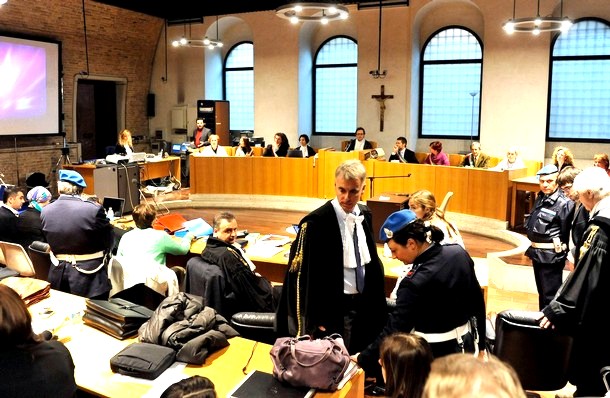
Tuesday, December 01, 2009
Andrea Vogt Asks Some Useful Questions Concerning The Legal Process
Posted by Peter Quennell
Click here to read all of this well-researched report on the Seattle P-I website.
After presenting an overview of the system similar to those posted here by Nicki and Commisario Montalbano Andrea Vogt asks two experts on the system these questions.
Do jurors have to find Knox guilty beyond a reasonable doubt?
Yes. The concept of proof beyond a reasonable doubt has long been a part of Italy’s justice system. It was formalized and passed into law in 2006.
Knox’s defense lawyer Luciano Ghirga said his team will remind jurors that, even after more than 40 hearings, everything is still in doubt.
The court’s ruling (which is not called a verdict in Italy) is made by an eight-member jury: six laymen and two professional judges. They will vote, and the majority rules. In the case of a 4-4 tie, acquittal overrules.
Could Amanda Knox have plea bargained?
Knox maintains her innocence.
However, while not completely analogous to plea bargaining, Italy does have a similar alternative to trial, also a part of the 1988 reforms. The alternative is not applicable for serious crimes, such as murder, punishable by more than five years in prison.
Suspects who cooperate fully with the police, however, may become eligible for a bundle of mitigating circumstances that would lower prison sentences. A judge may also choose to apply aggravating circumstances to increase a sentence.
Negotiation on the evidence—in which both sides agree what can be admitted—is also available when defendants choose a fast-track trial, as did Rudy Guede, sentenced to 30 years last year for his role in the case for which Knox is on trial. Guede is appealing his conviction.
Why does the figure of prosecutor seem so powerful in Italy?
The prosecutor is a powerful figure in Italy connected to the judiciary, not elected or appointed. While there is a career separation between judges and prosecutors, the qualifying examination and training are common, That has made judges and prosecutors close both culturally and professionally.
In the U.S., prosecutors are appointed in federal system and typically elected in the state system, hence it is common to hear cases referred to as The State vs. X.
In Italy, protections were put in place precisely to prevent the state from pursuing or persecuting, hence the independence of prosecutors.
As a result, prosecutors haven’t shied away from taking on politicians. Italian Premier Silvio Berlusconi, for example, faces a series of criminal procedures in the courts.
That independence , some argue, is precisely the protection needed as a check against government power, and without it, corruption could not be exposed, said Maffei. But others argue that prosecutors wage their own political battles. using their independence to attack political opponents.
Another major difference: the prosecutor supervises the investigation rather than letting police handle it.
Further, he or she also has no discretion over the decision to seek charges. There is a constitutional principle of mandatory prosecution. If there is sufficient evidence to build a case against a defendant, a prosecutor must seek an indictment.
In the U.S. prosecutors can and do drop cases for such reasons as workload or because the defendant has agreed to help with a criminal investigation.
Was it legal for Knox not to have an attorney present when police questioned her?
Yes and No.
Amanda Knox’s interrogation falls into a gray area of the law because she came voluntarily to the police station and was being interviewed in the beginning as someone who could become be a witness, not a suspect.
Then, in the course of questioning by police in November 2007, she blamed Patrick Lumumba for the slaying, and said she was present at the scene of the crime. Lumumba was innocent. Knox has since denied she knows anything about the slaying and says she wasn’t in the flat the night Kercher was killed. Limumba is suing Knox for slander.
The law is very clear: A suspect must not be interrogated without a lawyer.
Once a suspect, an interrogation must be interrupted, the suspect read his or her rights to remain silent and be provided a lawyer. Italian law does not allow waiver of one’s right to counsel. Even if a suspect doesn’t want a lawyer, the authorities are required to appoint one.
If a suspect’s freedom of movement is hindered, the interrogation must be videotaped.
In Knox’s case, a video or audio recording of the entire police interrogation (authorities have denied that any such recordings exist) could identify when police began treating Knox as a suspect and what procedures were followed.
In fact, Italy’s Supreme Court has already said that some of her early statements may not be used against her because they were made without an attorney present.
Comments
No comments yet. Commenting is not available in this channel entry.Where next:
Click here to return to The Top Of The Front PageOr to next entry Germany’s Der Spiegel Posts An Analysis Of The Case
Or to previous entry The Summations: Nick Pisa Sums Up Sollecito Lawyer’s Remarks About Knox DRAFT

